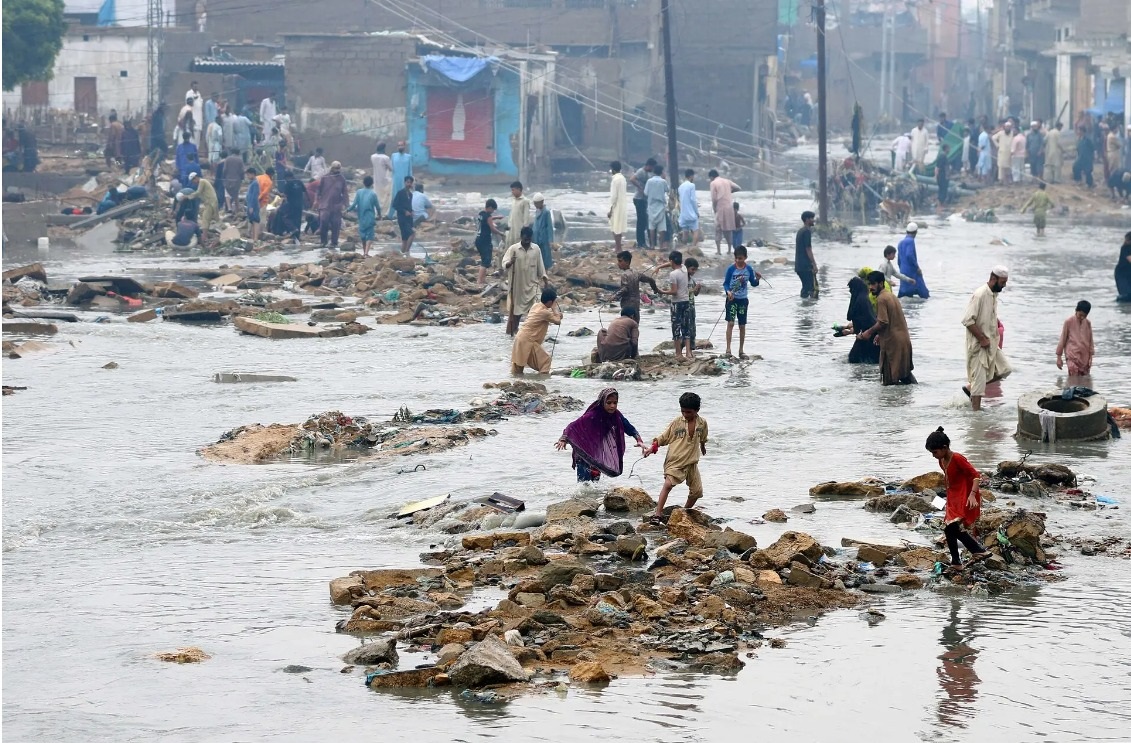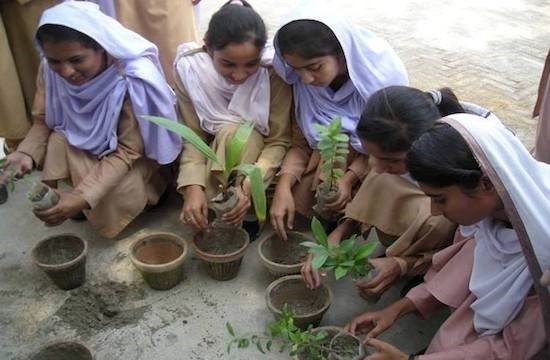
Written by: Haroon Shuaib
Posted on: September 15, 2023 |  | 中文
| 中文
It is important that we leave the world in a state where it can sustain our generations to come
While Pakistan produces less than 1% of the world’s carbon footprint, it is suffering some serious consequences of climate change. According to the Global Climate Risk Index, Pakistan is currently the fifth most climate-vulnerable country in the world. According to some estimates of the World Bank, the country has lost nearly 10,000 lives and suffered economic losses worth 3.8 billion USD due to climate change throughout the years 1999 to 2018. Just in the wake of 2022 floods, one third of the country was deluged under water, with 81 districts declared ‘calamity hit’ and about 33,000,000 people affected. This is a clear indication of how stressed our ecology is at the national level. COP 27 acknowledged the need for climate justice by establishing a Loss and Damage Fund to get developed economies to compensate countries such as Pakistan that are bearing the brunt of years of unaccounted carbon emissions by the developed world. However, Pakistan has yet to receive any recompence. According to the 2022 Adaptation Gap Report of UN Environment Programme, international adaptation finance flows to developing countries are five to ten times below estimated needs and will need over US$300 billion per year by 2030. Loss and damage finance needs are closely connected to developing countries’ ability to mitigate and adapt to the outcomes of climate change.

Calamities not only take away precious lives but also destroy infrastructure and neutralize developmental endeavors
Pakistan faces some of the highest disaster risk levels in the world, and is ranked 18 out of 191 countries by the 2019 Inform Risk Index. From floods to droughts, landslides to earthquakes, the frequency and severity of natural disasters are increasing with every passing year. But calamities and natural disasters are just the tip of the iceberg when it comes to understanding how climate change is impacting our ecosystem. Climate change is much more impactful and consequential than what transpires through disasters. What should be much more concerning is the fact that during the past century, an annual mean temperature increase of around 0.63°C has been observed in the country, and sea level along the Karachi coast has risen by approximately 1.1mm per year. By the end of the century, depending on the global emissions scenario continuing at the current rate, annual mean temperature in Pakistan is expected to rise by approximately 3°C - 6°C. The country must gear up its disaster predictability, mitigation, response and management systems in order to minimize the impending damage, but the measures needed to be taken need knowledge, resources and systems that are presently lacking.

It is important for youth to get involved with activities that raise awareness about the significance of ecological balance
The latest UN report, ‘Global Water Security 2023 Assessment’, places Pakistan in the critically water-insecure category, indicating that the country is facing a water emergency that requires immediate attention. The report highlights that Pakistan is among the most water-stressed countries in the world, with rapidly declining water availability per capita. It is ironic that while Pakistan is still struggling to recover from the devastation caused by last year’s floods, one of the gravest challenges it would face is of water scarcity. With climate change, rapid population growth and mismanagement, Pakistan’s water availability per capita has decreased by more than 80% over the last 70 years. Precipitation has been erratic due to climatic changes, resulting in increased variability in the magnitude and timing of rainfall, especially during the monsoon season. On the other hand, one-third of the surface water in the country gets lost or discharged into the sea and the groundwater resources are severely overdrawn, mainly to supply water for irrigation. With building large reservoirs, adopting smart and technology-based irrigation practices, and awareness about water conservation methods, this dreadful outcome can be averted to a large extent.
Pakistan is an agrarian economy and according to Pakistan Bureau of Statistics, the agriculture sector alone accounts for 24 percent of the country’s GDP, employing almost half of the country’s employable labour force, and being the largest source of foreign exchange earnings. Climate shocks have started to shake the foundations of Pakistan’s agricultural economy. For example, last year the wheat crop was impacted by the abrupt fluctuations in temperature. While wheat grain requires 10-12 days for maturity, sudden change in temperature reduced the period to four days, leading to reduction in size and weight of the grain. Cotton farmers were also left perplexed as monsoon patterns continued to shift. Regions previously known to be conducive for growing cotton are now losing their supportive climate for this important cash crop. Impact of climate change is also evident in the horticulture sector, particularly for mango production. Owing to harsh weather, Pakistan missed the mango production target in 2022. Livestock sector is also stressed as natural pastures are losing their ability to sustain large numbers of animals. A study points out that in Pakistan climate change will decrease agricultural productivity by 8-10% by 2040, and wheat will be one of the major losers. It is anticipated that wheat yield will decrease by 6% and the Basmati rice yield will fall by 15-18% across Pakistan, as crop seasons continue to shrink and shift. With rising sea level, sea intrusion in just Badin district has claimed hundreds of acres of productive land. Besides the direct economic impact on the agriculture sector, this will also result in further exacerbating the food security for the country, where already almost 58% of the population is food insecure. Pakistan must adopt measures on emergency footing to adopt climate smart agriculture, with measures such as introduction of crop varieties requiring less inputs particularly of water, relooking at the mapping of agro-ecological zones, and investing in research and development while working closely with farming communities. In this regard, Pakistan can also benefit from China through special agricultural cooperation programmes under CPEC.
Energy is at the heart of the climate challenge as a large chunk of the greenhouse gases that blanket the earth and trap the sun’s heat, are generated through energy production by burning fossil fuels to generate electricity and heat. Currently, Pakistan’s grid is fueled 63% by fossil fuels, 25% hydroelectric power and less than 6% renewable energy according to a study conducted by the International Growth Centre of London School of Economics and Political Science. The World Bank has proposed that 30% of energy should be renewable by 2030 in Pakistan. To meet this ambitious target Pakistan needs to promote renewable energy projects in the private sector, shift its industries to renewable energy sources, popularize the concept of energy efficient construction and improve its energy distribution systems. All these measures require increased level of financial flows, from banking, micro-credit, insurance and investment to the public, private and not-for-profit sectors to implement such innovations.
Pakistan has the highest rate of urbanization in South Asia. The 2017 National Population Census showed that 36.4% of the population lives in urban areas. The UN Population Division estimates that by 2025, nearly half the country’s population will be living in cities. Making these cities and new urban settlements environmentally sustainable must also be made a priority by governments at national, provincial and local levels. The allocation of resources must be equitable and planning for land and infrastructure development, services and amenities systems must take into account the ecological and climatic factors. Unchecked and imprudent growth of cities beyond a sustainable capacity will result in challenges for civic structures. However, it will also result in the lack of a resource-strapped government’s ability to manage man-made and natural disasters. Urban floodings can be one consequence of such unbridled expansion, as natural water courses are blocked off or construction is carried out on the banks of rivers and canals that are prone to experience flash floods during rainfall. Better town planning and a mass transit system with climate smart housing, will reduce pollutants and dependence on unsustainable energy.
Climate change is a global reality, and while Pakistan cannot do much to halt the way earth’s ecology is threatened, it can prepare to adapt and mitigate climate change’s impact. This requires the international community to abide by its commitments made at COP 27, and Pakistan’s policy makers must better plan and prepare for the impact of climate change on its population, almost 25% of whom live below poverty line.
You may also like: